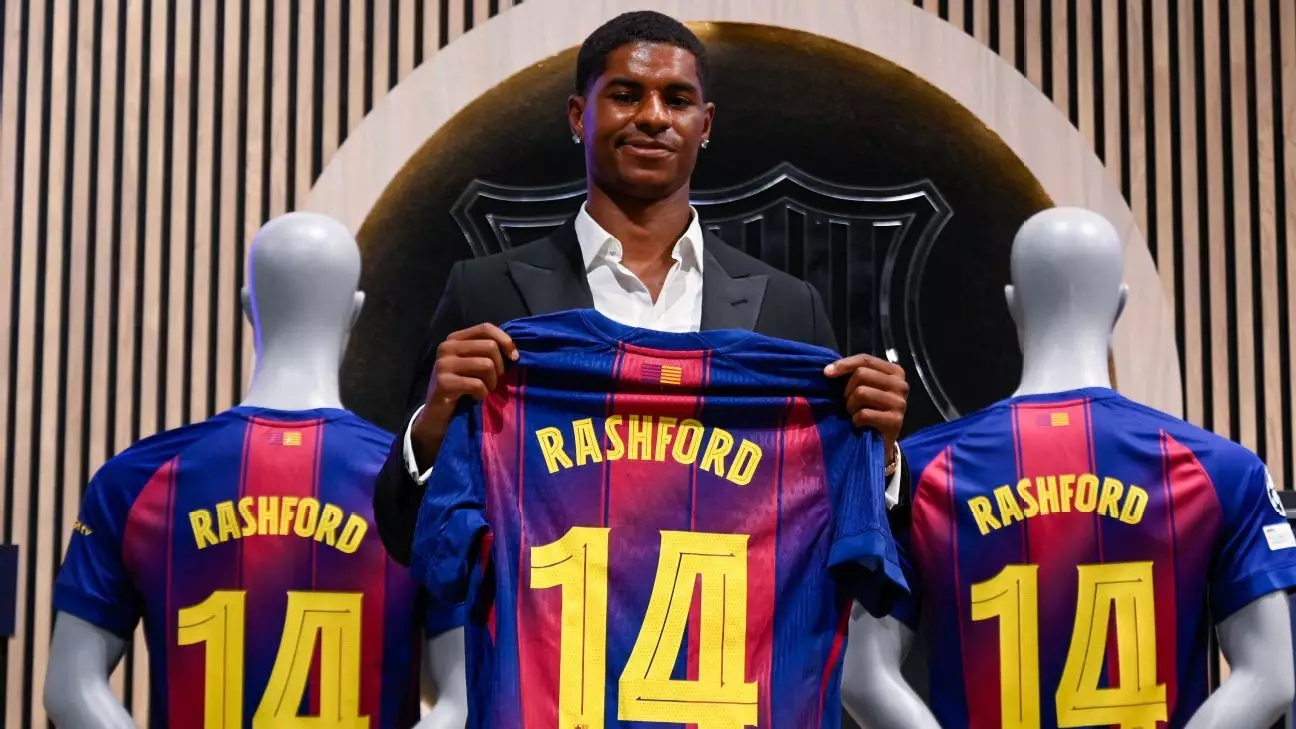Marcus Rashford’s recent transfer to Barcelona marks more than just a move across European clubs; it signifies a pivotal moment in his career—a reclamation of identity, ambition, and personal fulfillment. For a player who has been a Manchester United icon, this decision underscores an adventurous spirit eager to embrace fresh challenges and redefine his legacy. Rashford’s words about feeling “at home” at Barcelona resonate deeply, revealing his desire to be part of a club where aspirations transcend individual effort and become a collective pursuit of greatness. Such a sentiment demonstrates a mature understanding of football: it’s not merely about talent but about environment, culture, and shared goals.
This move challenges conventional notions that loyalty to one club molds a player’s identity. Rashford’s willingness to leave his boyhood club, especially amid the tumult of a difficult phase at United, exemplifies his hunger for growth and recognition beyond familiar grounds. His arrival at Barcelona embodies a risk—one that signals confidence, resilience, and an unyielding drive to flourish in Europe’s most competitive leagues. It’s an audacious statement: the idea that true success is found in embracing unfamiliar terrains with the mindset of shaping a new legacy, rather than resting on past laurels.
Barcelona’s Strategic Masterstroke and Rashford’s Personal Agenda
Barcelona’s keen interest in Rashford traces back to a strategic scouting process that underscores the club’s global ambitions. While the Spanish giants initially sought other options—Nico Williams and Luis Díaz—their persistence on Rashford illustrates a calculated move driven by both talent and market value. The club’s decision to sign him on loan with an option to buy reflects a pragmatic approach—investing in potential while assessing fit amid a competitive squad. That Rashford is willing to accept a substantial salary cut reveals his deep desire to succeed at Camp Nou, further cementing his commitment and belief in this new chapter.
This transfer can be viewed not just as an acquisition but as a gamble with considerable upside. Barcelona’s squad, stacked with star talent like Lewandowski, Raphinha, Olmo, and Yamal, is in a phase of rejuvenation that aligns perfectly with Rashford’s own quest for relevance and impact in European competition. The club’s desire to build a youthful, dynamic frontline suggests Rashford’s style of play—speedy, versatile, and goal-oriented—fits seamlessly into the Blaugrana philosophy. Moreover, the club’s recent triumphs in La Liga and domestic cups, coupled with their desire to conquer Europe, make this transfer a calculated bold move to reclaim European supremacy.
Yet beneath this strategic façade lies Rashford’s personal narrative—his redemptive journey from a sidelined star to a revitalized force. His departure from Manchester United was marred by strained relationships and a sense of stagnation, culminating in behind-the-scenes training updates and a failed Villa loan. The move to Barcelona signals a willingness to shed old limitations, a declaration that he perceives a better, brighter future elsewhere. It is a hedge against the frustrations of recent years—a chance to reinvent himself on the continent’s biggest stage.
The Psychological Dimensions of An Ambitious Risk
Choosing Barcelona over staying at Manchester United or moving elsewhere illustrates Rashford’s understanding that success demands risk-taking. The Premier League, with its relentless pace and physicality, may have suited his development; however, he now perceives greater potential for growth and recognition in La Liga’s technical environment. This decision challenges the stereotypical notion of loyalty as the ultimate virtue; instead, it champions self-awareness and a willingness to prioritize long-term aspirations over comfort.
Rashford’s readiness to accept a pay cut and transition from a familiar setting demonstrates an understanding of the sacrifices inherent in genuine ambition. It is easy to assume that talent alone guarantees success, but Rashford’s move exemplifies how the emotional and psychological aspects—trust in coaching staff, cultural alignment, personal motivation—play equally vital roles. His confidence in coach Xavi’s project and his admiration for Flick’s leadership further reaffirm that this is less about a transaction and more about a philosophical alignment with Barcelona’s ideals of elegant, relentless football.
Furthermore, this transfer can be viewed as a strategic mental reset. After experiencing abandonment at United, Rashford is seizing the opportunity to redefine his narrative—no longer as just a young prodigy, but as a seasoned player who dares to challenge his comfort zone. Wielding this mindset, he positions himself not merely as a participant but as a catalyst in Barcelona’s quest for European dominance.
The Broader Implications: Redefining Success in Modern Football
Rashford’s move to Barcelona exemplifies the shifting landscape of modern football, where identity, ambition, and market dynamics intertwine. It signals that players are increasingly willing to prioritize personal growth and legacy over tradition or loyalty. This transfer is emblematic of a new era—one where players seek out clubs that resonate with their ambitions and values, regardless of geographical or historical constraints.
In a broader sense, Rashford’s decision challenges the archetypal narrative of loyalty rooted exclusively in one club. It underscores that success is fluid and adaptable, shaped by strategic choices that reflect a player’s evolving identity. His willingness to adapt to a different footballing culture—embracing La Liga’s tactical nuances—sets a precedent for the new generation of players eager to forge diverse, global careers. The emphasis shifts from mere club loyalty to personal development, adaptability, and relentlessly pursuing greatness in all its forms.
This transfer also raises questions about the long-term project at Barcelona. Will Rashford’s arrival signal a broader shift towards blending young talent with experienced internationals? How will his presence impact the team’s tactical setup and European ambitions? These are the questions that underline the significance of this move—not just for Rashford, but for European football’s evolving dynamics.
In the end, Rashford’s bold step embodies a profound truth: ambition knows no boundaries and true success demands courage. His journey is an inspiring testament that dreams, when pursued with conviction, can transcend oceans and leagues. As he steps into the luminous spotlight of Catalonia, he carries with him a message—one of resilience, daring, and unwavering pursuit of excellence.

